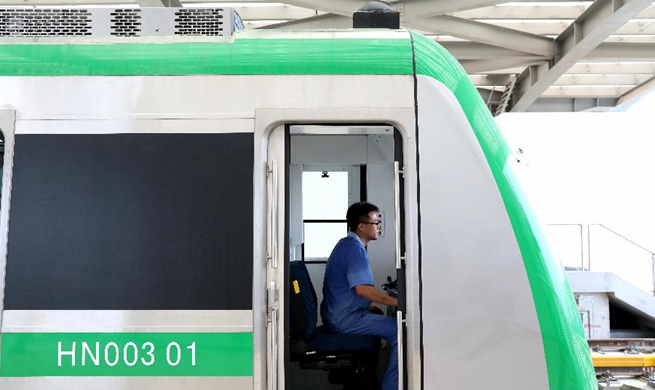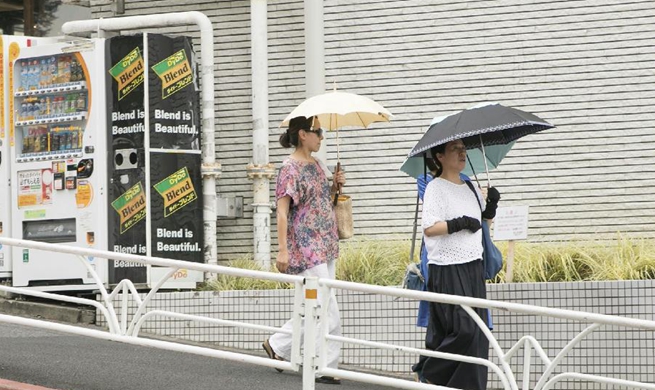BERLIN, Aug. 2 (Xinhua) -- Siemens has published mixed earnings data for the second quarter (Q2) of 2018 on Thursday, shortly after a new round of restructuring was announced at the German industrial corporation.
Gross revenue at the DAX-listed company fell by an annual rate of 4 percent to 20.5 billion euros (23.8 billion U.S. dollars) in Q2 as negative currency effects exerted downward pressure on the nominal value of sales. During the same period, the volume of the corporate orders rose by 16 percent to 22.8 billion euros thanks to several large new orders.
Operative profits from the core industrial business rose by 2 percent to 2.2 billion euros, resulting in an operative margin of 10.7 percent. The division was hereby buoyed by the strong performance of its "Digital Factory" business which specializes in solutions for the automation and digitalization of manufacturing.
Net profits fell from 2.2 billion euros in Q1 to 1.2 billion euros in Q2, a circumstance which Siemens blamed on rising taxes delivered by the company to fiscal authorities. Nevertheless, chief executive officer (CEO) Joe Kaeser highlighted what he described as a solid overall quarterly performance in a difficult industry environment.
"Our global team has delivered a strong quarter. This was underscored by excellent growth in new orders which outperformed the development of the wider market," a statement by Kaeser read. He added that the Munich-based company would continue to seize the opportunities and tackle the challenges it faced "in a responsible manner."
Speaking to press after a supervisory board meeting on Wednesday night, Kaeser surprisingly announced the launch of a further round of corporate restructuring at Siemens as the CEO prepares to step down from his post in 2021. The "Vision 2020+" strategy is aimed at decentralizing the management of the sprawling industrial conglomerate and granting individual divisions more autonomy.
"The core principle of the corporate strategy 'Vision 2020+' is to give the individual business significantly more entrepreneurial freedom under the strong Siemens brand," a statement by the company explained. Siemens hopes to achieve better mid-term growth in this fashion and achieve higher returns.
"The times in which we could centrally and efficiently direct project-, product-, software- and service companies with their diverse requirements are over," Kaeser said. If implemented, "Vision 2020+" would result in a much slimmer corporate headquarters with more employees being posted directly at Siemens' global network of subsidiary companies and business units.
For Kaeser, the restructuring effort could become his final legacy at Siemens as most of the projects outlined in the plan are scheduled for after the expiry of his contract. The CEO argued on Wednesday night that Siemens was now well-positioned to enter into a new phase of development as most of the goals of his earlier "Vision 2020" strategy had already been met.
Siemens' shift towards a more decentralized form of organization occurs against a backdrop in which capital markets are increasingly pressuring industrial juggernauts in Germany to break up their unified organizational structure into several independent businesses. The development has sparked an ongoing leadership crisis at ThyssenKrupp where the CEO and board chairman have both resigned due to disagreement with shareholders over the future trajectory of the company.
Nevertheless, Siemens labor representatives far expressed cautious optimism in reaction to the new "Vision 2020+" strategy. The path outlined by Kaeser was "correct in principle", supervisory board member and IG-Metall trade union executive Juergen Kerner said.
Kerner warned, however, that it would be fatal for the 171-year old corporation to be transformed into a pure holding vehicle for financial investors. "Slicing up corporations with a broad portfolio is currently a popular game played by the so-called financial markets but a company like Siemens can act out of its own strength," he argued.
Siemens has already partially-spun off some of its divisions by listing the Siemens Healthineers medical technology business and Siemens Gamesa wind power unit. The Franco-German railway company Siemens-Alstom established in a recent merger is next in line to be publicly-listed. Siemens currently retains a majority of shares in all three companies.













